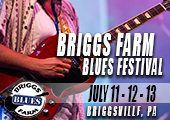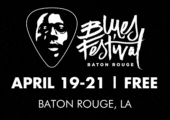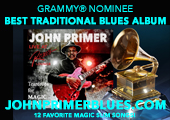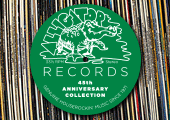LARRY TAYLOR AND THE TAYLOR FAMILY
 Generations of Blues: West Side Legacy
Generations of Blues: West Side Legacy
Nola Blue – NBR/024
This set is a celebration of the living legacy of Eddie Taylor, the legendary guitarist who helped create the Jimmy Reed sound in the 1950s and ’60s and also cut some of postwar Chicago blues’ most seminal recordings (1955’s Bad Boy, Bigtown Playboy from 1956, et al.) under his own name. Taylor’s wife, vocalist Vera Taylor, worked closely with him through the years; the album is dedicated to her, as well. Featured are drummer/vocalist Larry Hill Taylor (born to Vera in 1955, two years before she met Eddie), along with the late guitarist Eddie Taylor Jr., drummer Tim Taylor, and vocalists Demetria and Brenda Taylor. Also on offer is No Shine, a stark urban vignette written and performed by Larry’s son Dullah, a rapper who goes by the name LilJet2X. (Another Taylor sister, Edna, is also an accomplished vocalist, but she sings primarily in church and does not appear on this CD.)
As might be expected, the musical emphasis here is heavy on the 12-bar shuffles, updated at various points with modernist influences. Vocals are handled primarily by Larry, with star turns from Demetria and Brenda (Eddie Jr. is also featured on a low-key, almost tender reading of his father’s classic Big Town Playboy). To fill out the studio band, Larry, credited as producer along with keyboardist “Barrelhouse Bonni” McKeown, gathered together a crew consisting primarily of hardworking journeymen who perform on the city’s South and West Side blues circuits; harpist Matthew Skoller also weighs in, channeling the spirits of both Sonny Boys and both Walters throughout the set. If some of the subtlety and nuance that graced Eddie Taylor Sr.’s work is inevitably missing, it’s more than compensated for by the enthusiasm, well-honed chops, and obvious dedication of all concerned. (It’s clear that this project was in the works for some time; two of the sidemen, as well as Eddie Taylor Jr., have passed away.)
The program includes several gems from Eddie Sr.’s canon, one (I Found Out) from Vera’s oeuvre, a couple of standards usually associated with the so-called Chicago “West Side” sound (Magic Sam’s You Belong to Me, J.B. Lenoir’s Mama Talk to Your Daughter, reworked by Brenda as Talk to Your Son), and four Larry Taylor originals, as well as LilJet2X’s gritty tale of hard times, faith, and survival. (LB readers who might question a rapper on a blues set can relax—with the all-natural instrumental backing arranged and produced by McKeown, this outing makes clear the continuum between blues and the best of hip-hop and raises some tantalizing prospects for the future.)
At times, earlier recordings featuring the younger-generation Taylors have sounded somewhat stilted, as if the producers—or, perhaps, some of the musicians—were so intent on worshiping at the altar of “authenticity” they came close to sacrificing the grit and spontaneity that characterize true blues expression. That’s not the case here: accompanied by veterans who honed their craft playing the “real deal” in genuine blues settings, Larry, Eddie Jr. (both as a guitarist and a vocalist), Demetria, and especially Brenda sound surer, with greater timbral and emotional resonance and flexibility, than they ever have. Let’s hope the Taylors can continue to work and grow in settings like this as they move forward.
—David Whiteis
BOBBY RUSH
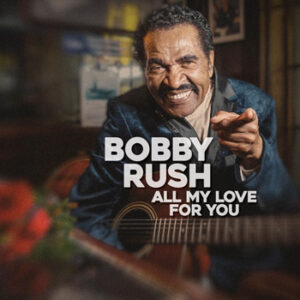 All My Love for You
All My Love for You
Deep Rush Records – No #
Bobby Rush is on a tear. Approaching his 90th birthday this November, the singer-songwriter-guitarist-harp player is as busy and productive as ever. In the first two decades of this century, Rush released some 16 albums and a career-spanning box set (Chicken Heads: A 50-Year History of Bobby Rush). The two-time Grammy Award winner, multiple Blues Music Award recipient, and perennial Living Blues Best Live Performer award winner who has also been inducted into the Blues Hall of Fame, the Mississippi Musicians Hall of Fame, the Rhythm & Blues Hall of Fame, and probably some others we’ve missed.
He remains a dynamic live performer, too, with live dates both in the US and at international festivals in Europe and beyond; by mid-2023 his concert schedule was already booked well into ’24. There’s no stopping the man. And that’s a very good thing.
Rush’s latest release is All My Love for You. Consistent with other entries in his catalog, this new set showcases the fun, mischief, and musical vision of this master. Keeping the instrumental lineup lean, he’s joined by Dexter Allen on bass and guitar plus Joey Robinson on drums and keys. Rush, of course, plays guitar and harmonica, writes all the music, and provides all of the vocals.
Bobby Rush’s good-natured approach to lyrics informs I’m Free, a laid-back, funky, and autobiographical tune that emphasizes his glass-half-full approach to life’s challenges. The slinky boogie-woogie of Runnin’ In and Out has hypnotic riff and some slyly amorous lyrics. I Want To has an understated instrumental arrangement that’s the aural equivalent of a cocky stroll down an urban sidewalk. Rush’s vocal and lyrics—concerning his interest in playing a game of what he calls “push and pull”—double down on that vibe.
Popular music has had many songs titled One Monkey Don’t Stop No Show (or similar words to that effect). Jump blues legend Stick McGhee may have been the first to use the phrase on a recording. Big Maybelle and Joe Tex had hits with it and girl group Honey Cone scored big in 1970 with a similarly titled R&B hit. And now in 2023, Bobby Rush revives the “answer record” with One Monkey Can Stop a Show. A tight horn chart punctuates the arrangement as Rush spins out examples to support his assertion.
The yearning I Can’t Stand It carves a deep groove, smoky, and sensual. Rush’s playful sense of humor informs the start-and-stop blues of TV Mama. He gets more serious for the love-song blues of I’ll Do Anything for You. Rush likes to name-check himself in his songs, and does just that on I’m the One, in which he sets himself apart from other well-known names while still according them due respect.
The well-earned braggadocio that’s a component of much of Rush’s material surfaces yet again on You’re Gonna Need a Man Like Me. And the up-tempo I Got a Proposition for You—you can already guess what he’s singing about here—underscores his argument, if anyone needed further convincing.
Amorous adventures aside, when it comes to the blues, Bobby Rush wins over the listener simply by doing what he does best: being the great Bobby Rush. And on All My Love for You, he does just that.
—Bill Kopp
D.K. HARRELL
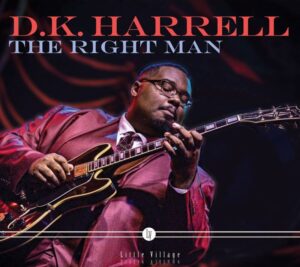 The Right Man
The Right Man
Little Village – LVF 1055
Louisiana native D.K. Harrell is rapidly garnering a reputation as a leading light of the younger generation of blues artists who have become increasingly recognized in recent years as carriers of the torch (contrary to the naysayers who have so long predicted that the blues is a dying art form). His guitar style strongly echoes the artists he cites as his heroes and role models, most notably B.B. King and Little Milton; he favors musical settings that also recall the burnished show-lounge sophistication that was their calling card.
For this, his first CD, Harrell has recruited some heavy hitters, including drummer Tony “T.C.” Coleman, whose resume has included stints with B.B. himself as well as Bobby “Blue” Bland, Otis Clay, Johnnie Taylor, and others of their stature, and bassist Jerry Jemmott, a.k.a. The Groovemaster, a former Atlantic Records session man who appeared on numerous major soul, R&B, and jazz recordings in the 1960s and ’70s and has been leading his own bands for over three decades (in recent years he’s also worked as Gregg Allman’s bass man). The result is a tight, crisply realized sound enriched by unselfconscious virtuosity from all concerned (plenty of chops on display, but no showboating or self-indulgence), giving Harrell the opportunity to relax and showcase his considerable talents to their best advantage.
Harrell is an expressive soloist with an admirable melodic and harmonic imagination, and if he doesn’t come up with a lot of earth-shatteringly new ideas, he’s fully capable of breathing new life and textures into lines and riffs based on themes closely associated with his idols. He seems to be still developing as a lyricist; some listeners will probably feel that a few too many of his songs are self-referential, extolling his dedication to the blues and his determination to keep the music alive, and his meditations on love won and lost sound mostly like those of a young man still acquainting himself with the mysteries of the heart. Predictably, he’s at his best when he and his band are at their most musically adventurous: Coleman and Jemmott’s deft interweaving funk patterns on You’d Be Amazed breathe new energy and life into a song whose lyrics once again proclaim that “I just wanna play my blues and bless all the people”; the two-part Not Here for a Long Time starts out as a propulsive funk blues workout featuring Harrell’s leads at their most biting and exploratory (even if, yet again, he has to remind us that “I just came to play the blues, and that’s a fact”); it then expands into a jubilantly raucous showcase for Harrell’s core back-up musicians as he name-calls each man and lets each do his thing, as if to remind us (and possibly himself?) that the best way to celebrate one’s prowess as a bluesman is to let the music speak for itself. That’s what Harrell and company achieve here.
In 2022, the Jus’ Blues Music Foundation bestowed on T.K. Harrell its “B.B. King King of the Blues Award” at their annual convention in Tunica, Mississippi; that may have struck some as premature for an artist still in his mid-20s, but judging from what’s here, it could well serve as a true prophecy.
—David Whiteis
NAT MYERS
 Yellow Peril
Yellow Peril
Easy Eye Sound – EES-031
The term “Yellow Peril” is a racist metaphor often applied to Asian immigrants who allegedly threaten Western values, implying that they are to be feared for their alleged villainy and malevolence. Think of the Chinese Exclusion Acts of 1882 and 1924. Admittedly, when this reviewer first heard Nat Myers opening cut, 75-71, he thought it was Jerron Paxton, or some other great Black country blues singer. As the album unfolded and the title cut, Yellow Peril, came up, the question arose as to why, even with all the solidarity one can muster, an African American would pen a song to challenge the white supremacist notion that East and Southeast Asians pose existential danger to the Western world. Given these perilous times, with the current COVID-related increase in anti-Chinese hatred and violence, perhaps it is feasible, though it’s not normally a topic for the blues that originated among African Americans in the early 20th century.
Which leads us to the elephant. It is not easily distinguishable from either the album cover, the singing style, or linguistic articulation that Myers is in fact not Black, so close are his adoptions of the original 1930s deep country blues style. On the album cover portrait, his ethnicity is indeterminate. Surprisingly, Myers is Korean American, which is at once a celebration of the diversity in the blues, and on another level a musical anomaly. He takes on the issues confronting Asian Americans, now and then, in this powerful title cut. Beyond the surprise element, it should not matter. The real revelation here is that Myers is simply superb. This newcomer transcends all stereotypes and kicks out some fiery, old-time, deep roots blues bound to shake up conventions. Unless we cling to primitive racialism, Myers should immediately be celebrated as a stunner, a fierce instrumentalist, a superb fingerstyle guitar picker and an astounding singer-songwriter. His debut album, Yellow Peril, produced by Dan Auerbach of the Black Keys, will surely raise some eyebrows, and hopefully for the right reason—artistic excellence.
On the album, full of gut-hitting emotion, Myers sticks closely to the well-worn melodies and style of the pre-WWII blues. Some will call it derivative; others will call it befitting and true to the authentic original blues.
If this album does not rank as one of the best traditional blues albums of the year it will be an injustice. Myers is one of the finest to emerge in the country blues since Jerron Paxton and Jontavious Willis. Yellow Peril is evidence that in a multi-ethnic society, we can acculturate and make an artistic contribution to the culture of others with dignity, respect, and reverence. Best of all, it is a blast song to song. Simply deep-groove, funky, and fierce country blues!
—Frank Matheis
ARLEN ROTH / JERRY JEMMOTT
 Super Soul Session!
Super Soul Session!
Blue Heart Records – BHR|049
Between the two of them, guitarist Arlen Roth and bassist Jerry Jemmott have brought powerful artistry to bear on decades’ worth of legendary recordings and live performances. Super Soul Session! is a long-in-the-works collaboration between the New York blues soul giants, and this 13-track collection gives a brace of classic tunes a fresh blast of energy and joy.
Roth’s limitless technique and improvisational invention are in command from the jump. His razory reading of the melodic line on Dancing in the Street is flashy and exciting; he brings a sinister, seductive force to Aretha Franklin’s Chain of Fools; and his solo on Down Home Girl hits like a shot to the solar plexus (he also contributes slyly funny vocals to this early Rolling Stones gem). But Roth is also capable of stunning tenderness, as on Good Time Charlie’s Got the Blues, his instrument almost subliminal in its empathetic effects behind African singer Mukamuri’s sensitive vocals. Roth even brings sincerity and flair to a twangy, album-closing take on America the Beautiful, backed by the passionate drone of Bruce Katz’s organ.
Throughout Super Soul Session!, bassist Jerry Jemmott fully earns his accolades as “The Groovemaster.” He joins forces with the crisp cymbals of drummer Chris Parker and the exultant backing vocals of Lexie Roth (daughter of the guitarist) to galvanize Jackie Wilson’s (Your Love Keeps Lifting Me) Higher and Higher. Jemmott has a high old time romping through the broad-shouldered riffs of the Uptown Horns on a memorably bumptious Shake, featuring the mighty voice and guitar of Joe Louis Walker. Jemmott also tips the cap to a few of his most illustrious past collaborators. His bass creeps through B.B. King’s The Thrill Is Gone like an ill-intentioned prowler, conjuring all the insinuating fervor of his work on King’s 1969 crossover hit single of the tune. And Jemmott delights as jovial M.C. on the roll-call rave-up Memphis Soul Stew, a valentine to King Curtis; this near-nine-minute cut also offers dynamic interludes from rhythm guitarist Tom Gage and saxophonists Crispin Cioe and Arno Hecht.
Produced by Roth and keyboardist Alex Salzman, Super Soul Session! rings loud and clear with all the vigor of the best Motown and Stax classics. Summer is rapidly drawing to its close, and one would be hard-pressed to find a better recording than this for taking those waning days out in a fine celebratory groove.
—Matt R. Lohr
GREG SOVER
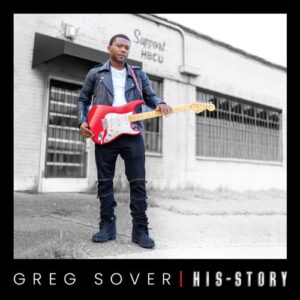 HIS-STORY
HIS-STORY
Crowded Soul Records – No #
It’s not every day an artist is able to enlist a collaborator of such storied stature as Billy Cox, the bassist who served a distinguished tenure in Jimi Hendrix’s Band of Gypsys. Or, for that matter, enlist a bass player with such sterling credentials as Kenny Aaronson. They’re but two of the notable players who grace Greg Sover’s new album, HIS-STORY, the emerging guitarist’s fourth offering and his best so far.
Then again, Sover has always maintained an archival interest. While his friends were listening to rap growing up, he immersed himself in classic rock, country, and blues. He picked up his instrument at the tender age of five and found inspiration in the great guitarists whose work is indelibly inscribed in the annals of an earlier era—Jimi Hendrix, Stevie Ray Vaughan, Eric Clapton, Jeff Beck, Duane Allman, Pete Anderson, and the three Kings—B.B., Freddie, and Albert. To this day, he claims that hearing the first few notes of Purple Haze literally changed his life and established the musical mantra he continues to pursue.
Of course, emulating and admiring are two completely different things, and in Sover’s case, it’s a bit of a fine line. His affection for Hendrix is obvious, given the fact that he covers two of his compositions—the widely known Manic Depression, which, surprisingly, he relays in an even more frenzied fashion than the original, and an obscure offering titled Remember, which was originally intended for Are You Experienced?. It’s easy to envision how well it might have fit.
The Hendrix influence overrides much of the album, and Sover’s searing riffs and dynamic delivery clearly reflect his reverence and respect for his hero’s animated approach, as demonstrated by such songs as Living on the Edge, Song 28, Temptation, and Freedom Part 2. Not that he is operating at full veracity throughout; certain songs—Dark House, Stuck in the Rain, and Tonight in particular—vary the vibe and dispense with the edge and agitation in favor of a somewhat more subdued and soulful style.
Ultimately, Sover succeeds in conveying a solid and stoic sound that brings to mind his aforementioned heroes, and he does so with both credibility and conviction. Is he a possible heir apparent? Only time will tell. In the meantime, his story will be well worth following.
—Lee Zimmerman
BLACKBURN BROTHERS
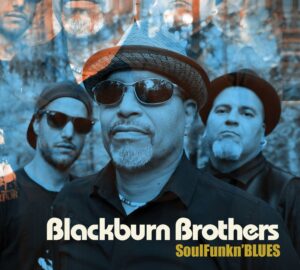 SoulFunkn’BLUES
SoulFunkn’BLUES
Electro-Fi Records – E-FI 3464
Comedian George Carlin once said of the blues that it’s not enough to know which notes to play; you’ve got to know why they need to be played. This wisdom ripples through every track on the Blackburn Brothers’ SoulFunkn’BLUES. The progeny of veteran Toronto R&B artist Bobby Dean Blackburn, the Brothers have got music deep in their bones, and this album surges forth with bracing conviction and authoritative virtuosity.
Lead vocalist Duane Blackburn’s voice is graced with satiny grit, capable of infusing playful desire into the bouncy rhythm of Be My Wife, then busting loose with righteous defiance over Pat Perez’s hard-swinging horns and guitarist Brooke Blackburn’s tasty wah-wah on the Neville Brothers’ civil rights tribute Sister Rosa. Duane’s piano packs a wrenching wallop on Bobby’s Blues, a muscular salute to the Brothers’ celebrated father, and his whining, squealing vocoder assault carries surprising emotional fire on the blues chestnut Goin’ Down Slow.
The Blackburn Brothers are descendants of a slave who escaped to Canada via the Underground Railroad, and their sense of place within the history of the Black struggle informs several of the album’s brightest highlights. Cory Blackburn’s in-the-pocket drums and Brooke’s sharp-sharded solo phrases amplify the strutting Black-is-beautiful vibe of Soul Brother (“Platform boots, watch the goldfish swim / Bell-bottom pants, no, you can’t touch him”). Brooke is equally biting on the gospel-kissed Freedom Train, where the horns rise from the beat like an unapologetic power-to-the-people call of destiny.
Even the album’s less overtly ambitious cuts are charged with confidence. Duane’s low-down organ and Nathan Blackburn’s teasing bass give Why Do I Do (What I Do) an airy, sexy flow. Cory leans in with full force, paired with the might of saxophonist Neil Brathwaite and trombonist Ted Peters, to drive the vigorous beat of Little Sister with a strength that’s almost terrifying. Guest bassist Mark Ayee puts no-nonsense funk under Duane’s dazzling vocoder skills on the tough-edged She’s a Heartbreaker, and Let the Devil Play simply crackles with the energy of Duane’s husky desperation, Nathan’s slippery rhythmic command, and Brooke’s snarl-of-Cerberus electric ax.
For all its up-to-the-minute power, SoulFunkn’BLUES closes on a charmingly old-school note with the ’50s-style ballad I Don’t Ever Want to Be Alone, complete with chiming malt-shop piano and dreamily swaying horns. It is a pure testament, as is the entire album, to the Blackburn Brothers’ near-effortless command of their craft.
—Matt R. Lohr
THE NICK MOSS BAND
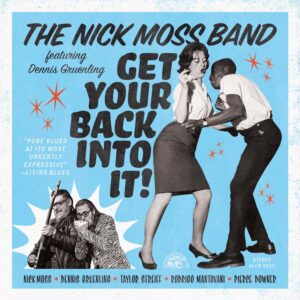 Get Your Back Into It!
Get Your Back Into It!
Alligator Records – ALCD 5013
Nick Moss has been leading his own bands for years; starting the late ’90s, he released a string of blues albums on his own label with the Flip Tops. By 2010 he billed himself as a solo artist, and explored the heavier, rock side of the blues. These days he’s back in more historically rooted territory, and beginning with his 2018 release The High Cost of Low Living (his first for Alligator), the guitarist has billed his group as the Nick Moss Band featuring Dennis Gruenling. A world-class harmonica player, Gruenling is a key to the creative dividends reaped by the current outfit.
In its current configuration, the Nick Moss Band has made a point of having it both ways: they trade in a style deeply enmeshed in high-octane Chicago blues, but rather than recycle classic songs of the genre, they present new and original material that honors and builds upon the form.
On Get Your Back Into It!, the group delivers volume and value. The set is packed with 14 tunes, each of which conjures the spirit of classic Chicago blues of yesteryear. Listeners who don’t know otherwise could easily mistake many of these songs for classics; only the improved sonic clarity marks Get Your Back Into It! as a collection of modern-day recordings.
Moss has a good-timing vocal presence that conjures thoughts of Louis Prima, Roy Brown, and other giants. His phrasing on The Bait in the Snare—set as it is against the chugging instrumental backing of this five-piece group—is spot-on. The character of vintage Paul Butterfield Blues Band is evoked on the riffing blues of Aurelie. The propulsive Man on the Move is sure to make the listener move as well.
But Get Your Back Into It! isn’t all good-natured, up-tempo blues. The stinging, swaggering, and sorrowful Living in Heartache explores another side. It Shocks Me Out features a spoken/sung vocal and shouted backing vocals that recall Louis Jordan and His Tympany Five. A thrilling instrumental showcase that gives each band member a turn in the spotlight, Out of the Woods adds a bit of jazz texture to the proceedings. Of particular note is Taylor Streiff’s organ work, but everyone shines here.
Moss and Gruenling burn brightest on Your Bark Is Worse than Your Bite; the rest of the group holds back to give them the spotlight. Gruenling takes full advantage of the space, tearing into an extended solo that will leave the listener gasping for breath.
Yet Get Your Back Into It! is very much the product of a group. Streiff’s saloon piano is tasty on Choose Wisely. The Solution is a momentary nod toward modern sounds; its urban character sets it apart from the rest of the record, while it fits nicely, adding variety. And Scratch ’N’ Sniff ends the record with some catchy, twangy instrumental work. As a sampler of the breadth of the Nick Moss Band’s artistry, Get Your Back Into It! is a triumph.
—Bill Kopp
T-MODEL FORD
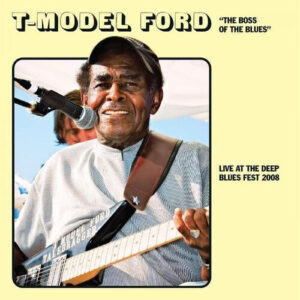 The Boss of the Blues: Live at the Deep Blues Fest 2008
The Boss of the Blues: Live at the Deep Blues Fest 2008
Alive Naturalsound Records – ALIVE0226
The late T-Model Ford’s life and career are a testament to the American blues tradition and its appeal. With a relatively small recorded output to his name, any time there’s a quality release that can add to his legacy, it’s notable and worth checking out.
Enter The Boss of the Blues: Live at the Deep Blues Fest 2008. Recorded at the Washington County Fairgrounds in Lake Elmo, Minnesota, at the July 18, 2008, incarnation of the festival, the eight-song (nine, if you grab it on CD) set captures a lively performance from a then-85-year-old Ford and backing band GravelRoad just before a series of health events severely curtailed his ability to play live.
The Boss of the Blues kicks off with the Ford original Hip Shakin’ Woman and it’s a barn burner. GravelRoad is locked into a tight groove and Ford’s vocals are spirited. Really, he’s in fine form throughout the performance and that’s what makes this LP a winner. His spin on Hoochie Coochie Man is anchored by the band’s sturdy vamp and some fine lead work by guitarist Stefan Zillioux. Ford is playful, exclaiming “Jack Daniel’s time!” upon the track’s conclusion.
Everybody is really cooking on the up-tempo Hi-Heel Sneakers. Ford belts out the lyrics with a palpable joyous enthusiasm and it makes for the highlight of the LP. CD-only cut Stella Mae is a slow blues jam that allows for GravelRoad to showcase some of its subtleties as a unit and offers a slight breather from a set otherwise full of barn burners. Ford and the band conclude their performance with an encore of his Got a Woman. It’s a fun one and ends Ford’s set on a high note. Taken as a whole, The Boss of the Blues offers a lovely snapshot of an unsung hero of the blues and keeps his memory and music alive for another generation of listeners.
—Jim Shahen Jr.
DOUG DEMING & THE JEWEL TONES
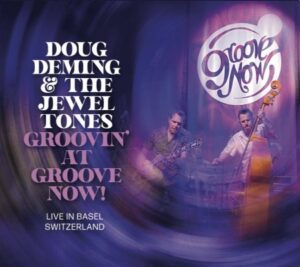 Groovin’ at Groove Now!
Groovin’ at Groove Now!
Endless Blues Records – DDGAGNO62023
Raised in Detroit and now calling Florida’s Gulf Coast home, guitarist Doug Deming can claim an impressive resume. He’s toured and recorded with the likes of Kim Wilson, Louisiana bluesman Lazy Lester, Texas musician Gary Primich, singer Alberta Adams, and Chicago’s A.C. Reed and Johnny “Yard Dog” Jones. However, it’s his work at the helm of his own outfit, the Jewel Tones, that has attracted him the most notoriety.
Of course, reputation is one thing, but the ability to live up to it in live performance is quite another, and that’s where Groovin’ at Groove Now! comes into play. Recorded live at Atlantis Basel in Switzerland, the album shows the pure potency that Deming and company have to offer. The six-piece, brass-infused combo shows off their strengths in a variety of musical motifs, from the jump and jive of East Side Hop and the saucy juke joint blues of Bloodshot Eyes, to the strut and sway that underscores Only Time Will Tell, the classic slow blues of An Eye for An Eye, and the swing and sashay echoing through Put It Down. It’s a commanding performance overall, and one that clearly expresses the confidence and capability this astute ensemble has to offer.
Deming is credited as producer, and he ensures that each player gets a turn in the spotlight. Two saxophonists—Sax Gordon and Terry Hanck—are employed throughout, while bassist Andrew Gohman and drummer Zack Pomerleau (who also shares his skill on harmonica) drive the rhythms, contributing ’50s style rock ’n’ roll rhythms to a take on the Fats Domino standard I’m Ready and a steady, somewhat sassy feel to the cover of Willie Dixon’s Oh Baby. Likewise, Bill Heid’s busy piano playing shimmers and shines in East Side Hop, No Sense, and Every Night When I Get Home, while his dense organ tones effectively underscore Put It Down.
Naturally, Deming’s distinctive fretwork provides the nucleus of each performance—Momma Didn’t Raise No Fool is an ideal example—but he makes no attempt to overshadow the others. This is indeed a taut, tight-knit combo, and the delivery easily rivals that of a far larger ensemble.
The result is nothing less than a fine example of blues in its various hues. Doug Deming and the Jewel Tones consistently sparkle, allowing Groovin’ at Groove Now! to stay true to its title.
—Lee Zimmerman


